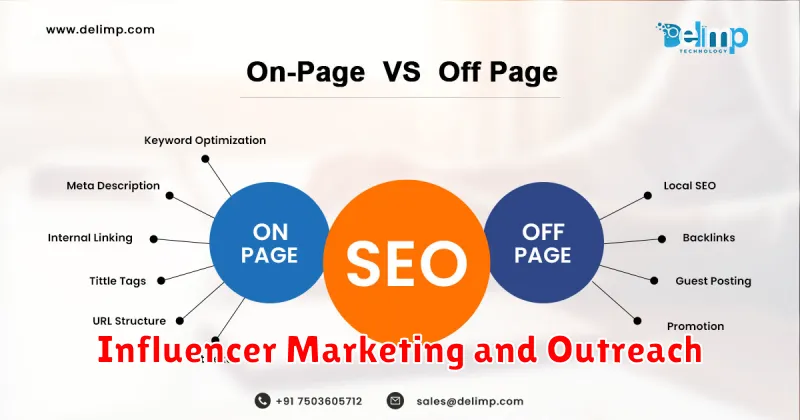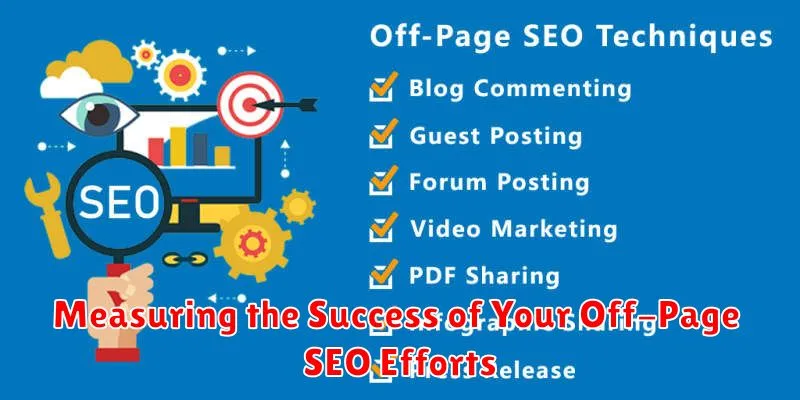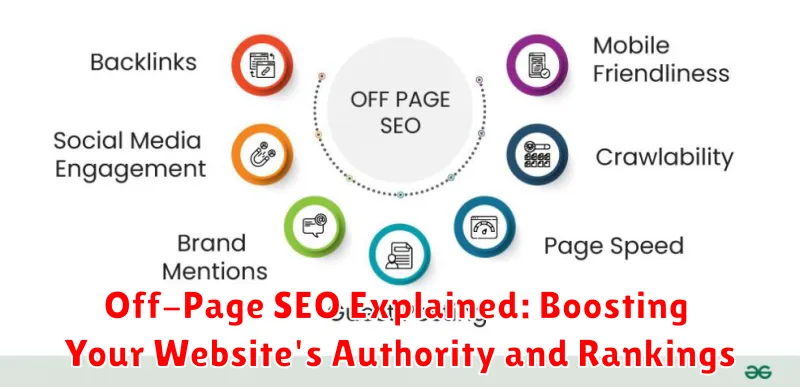In the competitive digital landscape, simply creating a website isn’t enough. To truly thrive online, you need a robust Off-Page SEO strategy. Off-Page SEO encompasses all the activities performed outside your website to improve its search engine rankings. This includes building high-quality backlinks, fostering positive brand mentions, and establishing a strong online presence. Effectively leveraging Off-Page SEO is crucial for boosting your website’s authority and driving organic traffic. Ignoring Off-Page SEO can significantly hinder your website’s ability to rank well in search engine results pages (SERPs), limiting its visibility and reach.
This comprehensive guide delves into the intricacies of Off-Page SEO, providing you with the knowledge and tools to enhance your website’s authority and rankings. We’ll explore proven Off-Page SEO techniques, discuss the importance of building a strong backlink profile, and explain how to effectively manage your online reputation. By mastering these strategies, you can elevate your website’s visibility, attract more qualified leads, and ultimately achieve your online marketing goals. Whether you’re a seasoned SEO professional or just starting out, understanding Off-Page SEO is essential for achieving online success. This guide will equip you with the insights necessary to navigate the complexities of Off-Page SEO and achieve tangible results.
Understanding Off-Page SEO and Its Importance
Off-page SEO encompasses all the activities performed outside your website to improve its search engine rankings. It’s a crucial aspect of SEO that focuses on building your website’s authority and reputation in the eyes of search engines like Google.
Unlike on-page SEO, which deals with optimizing elements within your website, off-page SEO concentrates on external factors. A primary focus is earning backlinks from other reputable websites. These backlinks act as votes of confidence, signaling to search engines that your website offers valuable and trustworthy content.
A strong off-page SEO strategy contributes significantly to higher search rankings, increased organic traffic, and improved brand visibility. It helps establish your website as a credible source of information within your industry.
Building High-Quality Backlinks
Backlinks remain a cornerstone of off-page SEO. They act as votes of confidence from other websites, signaling to search engines that your content is valuable and authoritative. Quality outweighs quantity when it comes to backlinks. A single backlink from a highly respected, relevant website holds more weight than numerous links from low-quality or spammy sources.
Focus on earning backlinks from authoritative websites within your niche. Relevance is key. A backlink from a website related to your industry is more beneficial than a link from an unrelated site, even if the latter has higher domain authority.
Natural backlink acquisition should be the primary goal. This involves creating high-quality, shareable content that naturally attracts links from other websites. Tactics like broken link building, guest posting (on reputable platforms), and content promotion can aid in earning valuable backlinks.
Avoid practices that can lead to penalties, such as buying backlinks, participating in link schemes, or obtaining links from irrelevant or low-quality directories. Focus on building a sustainable backlink profile that contributes to the long-term growth and authority of your website.
Social Media Engagement and Promotion
Social media plays a crucial role in off-page SEO, driving referral traffic and enhancing brand visibility. While social signals aren’t a direct ranking factor, a strong social media presence can indirectly impact SEO.
Engaging content is key. Create posts that encourage interaction, such as asking questions, running polls, and sharing valuable information related to your industry. Responding to comments and messages promptly fosters a sense of community and encourages further engagement.
Promoting your content strategically across various platforms is essential. Tailor your message to each platform’s audience for maximum impact. Consistency is crucial. Regularly posting fresh, relevant content keeps your audience engaged and reinforces your brand’s presence.
Brand Mentions and Online Reputation Management
Brand mentions, even without a direct link, contribute to your website’s visibility and authority. Search engines recognize these mentions as indicators of relevance and popularity. Tracking brand mentions allows you to identify opportunities for link building, engage with your audience, and address any negative sentiment.
Online reputation management (ORM) is crucial for off-page SEO success. A positive online reputation strengthens your brand’s credibility and encourages trust among users and search engines. Actively monitoring reviews, addressing customer feedback, and resolving complaints demonstrates a commitment to customer satisfaction, which positively impacts your search rankings.
Proactively managing your online presence helps cultivate a positive brand image. This involves addressing negative reviews professionally and promptly, showcasing positive testimonials, and engaging with your audience across relevant platforms.
Guest Blogging and Content Outreach
Guest blogging involves writing and publishing articles on other websites within your niche. This practice offers several benefits for off-page SEO. By contributing valuable content to reputable sites, you can expose your brand to a wider audience and establish yourself as an authority figure. Furthermore, a link from the guest post back to your website provides a valuable backlink, which can positively influence your search engine rankings.
Content outreach is the process of promoting your content to other websites and bloggers in your industry. This can involve sharing blog posts, infographics, videos, or other valuable assets. Successful content outreach can lead to backlinks, increased brand visibility, and referral traffic.
When pursuing guest blogging and content outreach, it’s crucial to focus on quality over quantity. Target authoritative websites within your niche and create content that is genuinely valuable to their audience. Building relationships with influencers and bloggers is essential for successful outreach. Avoid spammy tactics, and prioritize authentic engagement.
Forum Participation and Community Building
Engaging in relevant online forums and communities is a valuable off-page SEO tactic. Active participation builds your brand’s reputation and establishes you as a knowledgeable resource within your industry. This can lead to increased website traffic and improved search engine rankings.
When participating in forums, it’s essential to focus on providing valuable contributions. Answer questions, share insights, and offer helpful advice. Avoid overtly promotional language. Instead, focus on building genuine connections with other users. This fosters trust and credibility, ultimately benefitting your SEO efforts.
Identifying the right forums is crucial. Look for communities where your target audience is active. Consider industry-specific forums, general discussion boards, and social media groups. By strategically selecting your platforms, you can maximize the impact of your community-building efforts.
Influencer Marketing and Outreach

Influencer marketing leverages the reach and credibility of individuals with a substantial online following within your niche. Partnering with influencers can expose your brand to a larger audience and build trust.
Identify relevant influencers in your industry. Consider factors like audience demographics, engagement rates, and content alignment. Outreach should be personalized and clearly communicate the mutual benefits of a partnership. This could involve sponsored content, product reviews, or social media mentions.
Outreach extends beyond influencers to include connecting with webmasters, bloggers, and journalists. Building relationships with these individuals can lead to valuable backlinks and media coverage. Focus on providing value and building genuine connections rather than solely pursuing links.
Measuring the Success of Your Off-Page SEO Efforts

Tracking the effectiveness of your off-page SEO strategy is crucial to understanding its impact and making necessary adjustments. Key performance indicators (KPIs) provide quantifiable metrics to assess your progress.
Referral Traffic: Monitor increases in traffic coming from other websites. This indicates the success of your backlink building and promotional activities. Analyze which referral sources are most effective.
Domain Authority (DA) and Page Authority (PA): These metrics, provided by Moz, offer a snapshot of your website’s authority and individual page strength compared to others. Growth in these scores suggests your off-page efforts are strengthening your website’s overall authority.
Keyword Rankings: Observe changes in your search engine rankings for targeted keywords. Improved rankings often correlate with successful off-page optimization.
Social Media Engagement: Track metrics like shares, likes, and comments to gauge how well your content resonates with your target audience and how effectively it’s being amplified.

